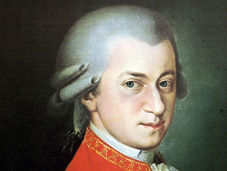Classical Outline for Beginners
 This is Mozart, not David
This is Mozart, not David
At forty-three I started studying classical piano after spending three decades working as a commercial musician. Four years and five thousand hours of practice later, I graduated with an ARCT from the Royal Conservatory of Music, a national, provincial, and local scholarship winner. My musical life has never been the same.
Why did I switch over?
Just prior to this I’d spent an idyllic summer in Spain, next to the Mediterranean. On the condominium balcony, with a borrowed sixty-five key Yamaha keyboard, I played Bach and Chopin during siesta. I was quickly hooked on the beauty of this music; so, when I came home, I found a qualified teacher and started earnestly studying and practicing.
Whether your goal is to sit for a piano exam, prepare for a post-secondary education audition, or just explore the repertoire and have some fun, we will follow the curriculum outline below. The outline below has been in continuous use since the mid 19th c., with a proven worth for generations of classical music students.
Repertoire. It is important that we work on pieces appropriate for your level. If the music is too easy, you’ll get bored. If the music is too difficult you will get frustrated. To use a martial arts analogy. If you are a white belt, I’ll prepare you for your yellow belt. With time and effort, you will progress to your black belt. However, please bring a list of aspirational titles you aspire to play. This will help me develop a curriculum that will appropriately incorporate these pieces.
Technique. The foundation of musicianship is instrumental technique. Piano technique is about training the hands to do what they are told. Over time, technique becomes internalized to the point that artistic and technical decisions within a piece, a passage, or a note are executed automatically.
Sight-reading. Good sight-reading skills make it easier to learn new pieces. Sight-reading is about pattern recognition that combines your technical, theoretical, and aural skills, and musical experiences into a single act. Good sight-readers can just play the piano. Good sight-readers can lead a sing song.
Ear training and aural skills. When you can hear music analytically it is easier to play it. Playing by ear is a teachable skill. You will learn to recognize intervals, chords, chord progressions, and melodies using a laddered approach from simple to complex.
Theory. Understanding what you are reading and hearing is one of the most effective shortcuts there is. A solid grounding in theory and musical rudiments will assist your ability to sight-read, to understand the music you are reading, to play with more sophistication, and to effectively communicate with the teacher.
Practicing. Pavarotti said something to the effect that, ``practice is a form of devotion. `` I will teach you to practice like an expert musician.
David
Why did I switch over?
Just prior to this I’d spent an idyllic summer in Spain, next to the Mediterranean. On the condominium balcony, with a borrowed sixty-five key Yamaha keyboard, I played Bach and Chopin during siesta. I was quickly hooked on the beauty of this music; so, when I came home, I found a qualified teacher and started earnestly studying and practicing.
Whether your goal is to sit for a piano exam, prepare for a post-secondary education audition, or just explore the repertoire and have some fun, we will follow the curriculum outline below. The outline below has been in continuous use since the mid 19th c., with a proven worth for generations of classical music students.
Repertoire. It is important that we work on pieces appropriate for your level. If the music is too easy, you’ll get bored. If the music is too difficult you will get frustrated. To use a martial arts analogy. If you are a white belt, I’ll prepare you for your yellow belt. With time and effort, you will progress to your black belt. However, please bring a list of aspirational titles you aspire to play. This will help me develop a curriculum that will appropriately incorporate these pieces.
Technique. The foundation of musicianship is instrumental technique. Piano technique is about training the hands to do what they are told. Over time, technique becomes internalized to the point that artistic and technical decisions within a piece, a passage, or a note are executed automatically.
Sight-reading. Good sight-reading skills make it easier to learn new pieces. Sight-reading is about pattern recognition that combines your technical, theoretical, and aural skills, and musical experiences into a single act. Good sight-readers can just play the piano. Good sight-readers can lead a sing song.
Ear training and aural skills. When you can hear music analytically it is easier to play it. Playing by ear is a teachable skill. You will learn to recognize intervals, chords, chord progressions, and melodies using a laddered approach from simple to complex.
Theory. Understanding what you are reading and hearing is one of the most effective shortcuts there is. A solid grounding in theory and musical rudiments will assist your ability to sight-read, to understand the music you are reading, to play with more sophistication, and to effectively communicate with the teacher.
Practicing. Pavarotti said something to the effect that, ``practice is a form of devotion. `` I will teach you to practice like an expert musician.
David
"I know that the most joy in my life has come to me from my violin." - Albert Einstein